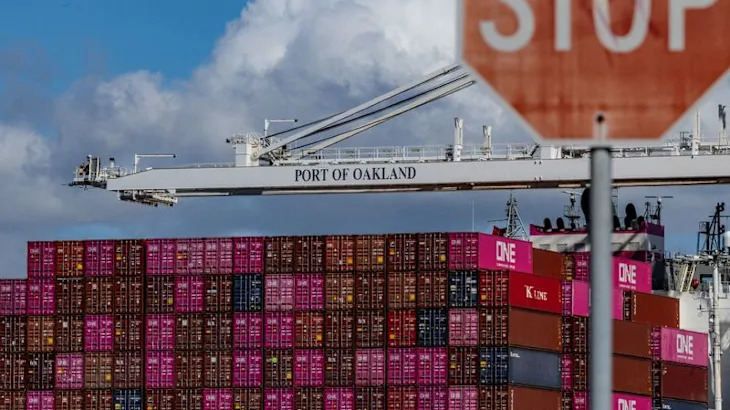
Trump's trade war ripples through the business world, hits stocks again
By Nora Eckert, Kalea Hall and Elisa Anzolin
(Reuters) -The ripple effects of Donald Trump's global trade war are increasingly being felt across numerous industries all at once and on Wednesday were once again exerting pressure on U.S. stock markets that have been roiled for weeks by his erratic trade policies.
Stocks fell broadly, with tech stocks hit particularly hard after bellwethers like Nvidia that are highly tied into the world's supply chain warned of hits to their bottom line.
Meanwhile, airlines said they are bracing for an uncertain summer travel season, and the head of the Federal Reserve noted slowing economic activity - but also cast a wary eye on the threat that tariffs pose to its goal of lowering inflation.
And though Trump has said numerous countries are lining up to make deals with the United States, the progress has been slow and uncertain. The president was set to engage personally in talks with Japan over tariffs later on Wednesday.
While the market volatility that erupted two weeks ago has ebbed, business leaders still say the uncertainty is stalling spending plans. The world's two largest economies - the United States and China - remain in a full-blown trade war, and the status of U.S. talks with the European Union, Canada and other countries is unclear.
"What was true yesterday is no longer true today, what will be tomorrow I do not know," said Jean-Christophe Babin, CEO of Rome-based Bulgari, the jewelry subsidiary of luxury giant LVMH, regarding U.S. tariff policy.
TECH SELL OFF
Tech companies were at the forefront of Wednesday's ructions. AI chip giant Nvidia said its sales to China would cost it $5.5 billion in accounting charges due to the administration's curbs on AI chip exports, while ASML, the world's biggest supplier of computer chip-making equipment, said tariffs have made the outlook for both 2025 and 2026 uncertain. Other U.S. chip equipment makers could see a hit of about $1 billion yearly due to the levies, industry officials told lawmakers last week.
Stocks overall slid again on Wednesday, with the tech-dominated Nasdaq Composite falling 3%, led by a 7% drop in Nvidia. Fellow chipmaker Advanced Micro Devices said it would take a $800 million hit from the administration's curbs on sales to China.
Even more optimistic companies tempered their positivity. United Airlines maintained its profit outlook for 2025, but unusually, laid out two scenarios for the year, saying that the macro environment was "impossible to predict this year with any degree of confidence."